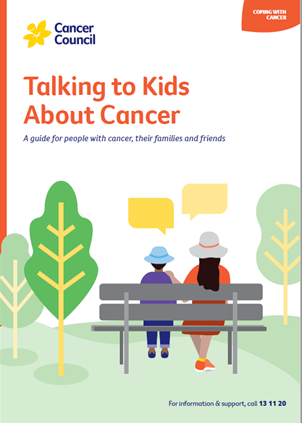- Home
- About Cancer
- Family and friends
- Talking to kids about cancer
- Talking about the diagnosis
- If your child is diagnosed
If your child is diagnosed
Families often describe the days and weeks after their child’s cancer diagnosis as overwhelming. Among the many confronting decisions they face is how to talk to the child about the illness.
Be honest
Children with cancer tend to feel more secure when the adults around them are open – hiding the truth to protect a child may lead to greater anxiety.
Match explanations to your child’s age
How much information you share with your child will depend on their age and maturity. Keep your initial explanations simple and take your cue from your child as to whether they want to know more. The first conversation will be followed by many others, so you will have the opportunity to give more detail as the need arises.
Seek guidance
Someone from the paediatric oncology team will be able to provide guidance and assist you with these discussions.
For younger children, some hospitals have therapists (may be called child life therapists) who teach children strategies to manage their illness and can help you explain the diagnosis and treatment.
If you have an older child with cancer, get in touch with one of the Youth Cancer Services. These hospital-based services offer specialised treatment and support to people aged 15–25.
For details, visit Canteen’s Youth Cancer Services.
Children and teenagers will respond to their cancer diagnosis in different ways. Fear, anger or sadness are all common reactions. Let your child know that it’s normal to have a lot of different feelings and it’s okay to express these emotions. You can also talk to them about finding ways to cope with these challenging feelings.
Support for families
Remember that your child’s hospital team is there to support the family as well. The social worker can let you know what support services are available, particularly if you need to travel long distances for treatment.
Some organisations have developed resources for parents of children diagnosed with cancer, including:
- Paediatric Integrated Cancer Service.
- Cancer Australia’s Childrens Homepage.
Share decisions
As much as possible, include your child in discussions about their treatment, and encourage them to ask questions. Older children and teenagers may want to seek out information themselves. You can point them to reliable organisations such as Camp Quality, Canteen and Redkite (Learn about other support services).
→ READ MORE: When a sibling has cancer
Podcast: Family Dynamics and Cancer
Listen to more episodes from our podcast for people affected by cancer
More resources
Prof Jane Turner AM, International Psycho-Oncology Society President Emeritus,The University of Queensland, QLD; Taylor Baker, Consumer; Dr Ben Britton, Principal Clinical and Health Psychologist, Head of Psychology, Hunter New England Mental Health, NSW; Camp Quality; Dr Lisa Cuddeford, Head of Department, WA Paediatric Palliative Care Service, Perth Children’s Hospital, WA; A/Prof Peter Downie, Head, Paediatric Haematology–Oncology and Director, Children’s Cancer Centre, Monash Children’s Hospital, VIC; Dr Sarah Ellis, Clinical Psychologist, Kids Cancer Centre, Sydney Children’s Hospital, NSW; Malia Emberson-Lafoa’i, Consumer; Kate Fernandez, 13 11 20 Consultant, Cancer Council SA; Jane Gillard, Consumer; Mary McGowan OAM, International Childhood Cancer Advocate, VIC; Annette Polizois, Senior Social Worker, Women, Family and Emergency Care Team, Royal North Shore Hospital, NSW; Rhondda Rytmeister, Clinical Psychologist, HeadWayHealth (formerly Snr Clinical Psychologist, The Cancer Centre for Children, Westmead, NSW); Nadine Street, Head of Social Work and Social Welfare, HNE Mental Health Service, NSW; Warren Summers, Online Counsellor, Canteen, NSW.
We would also like to thank the health professionals, consumers, organisations and editorial teams who have worked on previous editions of this title, and we are grateful to the parents and young people whose real-life stories have added to the richness and relevance of this book.
We thank and acknowledge Dr Paula K. Rauch, MD, Founder and Director, Marjorie E. Korff PACT (Parenting At a Challenging Time) Program and Associate Professor of Psychiatry, Harvard Medical School, whose research and writing on helping parents talk to their children about cancer was used as source material for this book and has been adapted in several sections: pages 8–11, How children understand cancer; page 22, Answering key questions: Are you going to die?; page 26, Involving the school or preschool; pages 30–31, Hospital visits; and pages 36–37, Encouraging family time. We also thank the American Cancer Society for permission to use and adapt material on pages 8-11 from its book Cancer in Our Family: Helping children cope with a parent’s illness (2013); Macmillan Cancer Support for permission to use its book Talking to Children and Teenagers When an Adult Has Cancer (2013) as a source of information; Jessica Watt, Oncology Social Worker, The Children’s Hospital at Westmead, for her contribution on page 20, When another child has cancer; and Diane McGeachy, Hobart Counselling Centre, for contributing material for page 37, Spending one-on-one time.
View the Cancer Council NSW editorial policy.
View all publications or call 13 11 20 for free printed copies.

